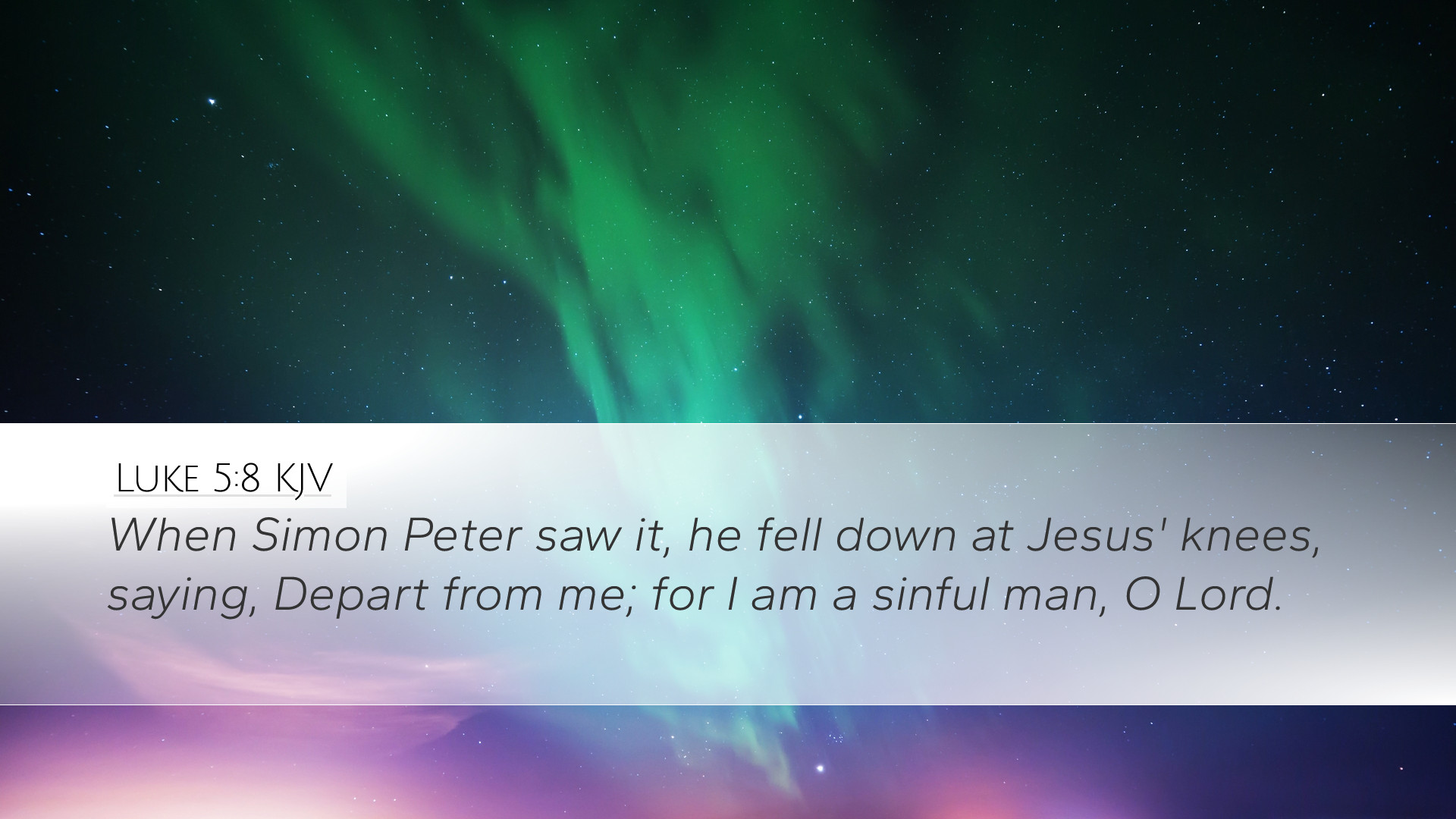Commentary on Luke 5:8
Bible Verse: "When Simon Peter saw it, he fell down at Jesus' knees, saying, 'Depart from me; for I am a sinful man, O Lord.'" - Luke 5:8 (KJV)
Introduction
This verse captures a pivotal moment in the life of Simon Peter, one of Jesus’ closest disciples. It is marked by a profound realization of sinfulness in the presence of holiness. This commentary draws upon insights from various public domain sources to explore the theological and pastoral implications of this encounter.
The Context of the Passage
Before diving into the specifics of verse 8, it is essential to understand the context surrounding this encounter. Luke 5 narrates the miraculous catch of fish, which serves as a backdrop to Peter's transformative moment. As noted by Matthew Henry, the situation was designed to reveal Jesus' authority over nature, which prompted a deeper understanding of His identity.
Albert Barnes emphasizes that the miraculous catch is the first significant step in Peter's calling to discipleship. This miracle serves to illustrate not just Jesus' power, but importantly, it leads Peter to a personal confrontation with his own inadequacies and sinfulness.
Peter's Reaction: Acknowledgement of Sinfulness
Upon witnessing the miraculous catch, Peter's immediate reaction is one of fear and humility. He recognizes the holiness of Jesus, which leads him to a powerful confession. Adam Clarke comments that this moment reveals the true nature of Peter's heart; faced with divine perfection, he is acutely aware of his shortcomings.
- Fear and Reverence: Peter's fear signifies the realization of standing before God. Henry notes that such fear is not merely terror, but a profound respect and reverence for the divine.
- Confession of Sin: Peter's cry, "Depart from me; for I am a sinful man," demonstrates a genuine acknowledgment of his unworthiness. Barnes explains that this phrase is a recognition of the divine glory of Christ juxtaposed with human frailty.
- Understanding Holiness: Clarke highlights that Peter's understanding of holiness is transformative. It is the starting point of his journey toward grace and redemption.
Theological Implications
Peter’s reaction invites an exploration of several theological themes that are significant for pastors, students, and theologians:
- Human Sinfulness: The theme of human sinfulness is central to this passage. Peter’s confession parallels the universal need for redemption. Henry reflects on how this moment captures the essence of the human condition before a holy God.
- The Nature of God's Call: The call to discipleship is initiated not from a position of self-righteousness but from an awareness of one's shortcomings. Barnes suggests that God often calls those who are aware of their weaknesses.
- The Beginning of Transformation: This moment marks the beginning of Peter’s transformation. The admission of sin is the first step toward grace, which Clarke emphasizes as essential in spiritual growth.
Practical Applications for Ministry
This verse provides rich material for pastoral application. Here are some ways to apply the insights drawn from this passage:
- Encourage Self-Reflection: Encourage congregants to reflect deeply on their own lives in light of God’s holiness. As Barnes suggests, an awareness of sin can lead to genuine repentance and transformation.
- Invite Authentic Confession: Foster an environment where individuals feel safe to confess their struggles and acknowledge their need for grace—just as Peter did.
- Highlight the Power of Grace: Preach the powerful message of grace that follows the acknowledgment of sin. The process of recognizing one’s sin can lead to a deep appreciation for the redemptive work of Christ.
Conclusion
Luke 5:8 offers profound insights into the nature of human sinfulness and the response of true reverence in the presence of Christ. Through Peter’s reaction, we are reminded of the continual need for self-examination and the importance of recognizing our standing before a holy God. The transformation that begins with humility and confession lays the foundation for discipleship and growth in grace. As we reflect on this passage, may we, like Peter, be moved from fear to faith, recognizing both our inadequacies and the immense grace offered to us through Jesus Christ.


